COVID-19: TCTMD’s Daily Dispatch for February Week 3
We’re curating a list of COVID-19 research and other useful content, and updating it daily.
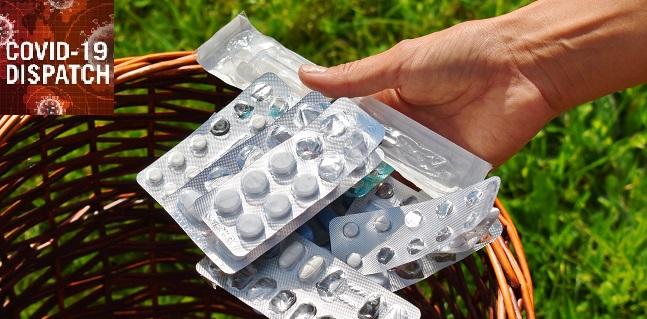
TCTMD reporter Todd Neale is keeping up on breaking news and peer-reviewed research related to COVID-19 and will update daily. If you have something to share, tell us. All of our COVID-19 coverage can be found on our COVID-19 Hub.
February 19, 2021
 Extending the interval between first and second doses of the Oxford/AstraZeneca vaccine from 6 weeks to 3 months boosts efficacy from 55% to 81%, says a Lancet meta-analysis published today. Efficacy between doses was 76%, write the authors, who combined randomized controlled trials from the UK, Brazil, and South Africa for a total of 17,178 participants. “Where there is a limited supply, policies of initially vaccinating more people with a single dose may provide greater immediate population protection than vaccinating half the number of people with two doses,” lead author Andrew Pollard, FMedSci, is quoted in a press release.
Extending the interval between first and second doses of the Oxford/AstraZeneca vaccine from 6 weeks to 3 months boosts efficacy from 55% to 81%, says a Lancet meta-analysis published today. Efficacy between doses was 76%, write the authors, who combined randomized controlled trials from the UK, Brazil, and South Africa for a total of 17,178 participants. “Where there is a limited supply, policies of initially vaccinating more people with a single dose may provide greater immediate population protection than vaccinating half the number of people with two doses,” lead author Andrew Pollard, FMedSci, is quoted in a press release.
Pfizer/BioNTech scientists say their vaccine is stable at normal pharmaceutical freezer temperatures (-25°C to -15°C), meaning that the product could be stored at these temperatures for a total of 2 weeks as an alternative to ultra-low temperature freezers (-80°C to -60°C or -112°F to ‑76°F). The company has submitted the data supporting these claims to the US Food and Drug Administration. “If the FDA grants Pfizer’s request, it could make it easier to distribute the vaccine across the US at a time when the pace of inoculations has been slow,” CNBC points out. It would also have major implications for countries with remote, rural populations.
The United States will make good on its promise to donate $4 billion to an international campaign to make and distribute vaccines all over the globe, President Joe Biden told a virtual Group of 7 meeting today, the New York Times reports. The same article notes that the coronavirus fight got a second boost today with news that US-based Novavax is committing to making and selling 1.1 billion doses of its vaccine, although it has not yet been approved by any regulatory authorities worldwide. Phase III trials are ongoing in the US, UK, and Mexico.
 Most of the research into “long COVID” has been done in patients admitted to the hospital: in JAMA Network Open, Jennifer Logue, BS, and colleagues detail the longer-term symptoms seen in COVID-19 outpatients, as compared with healthy controls. The most common persistent symptoms in their longitudinal sample were fatigue (13.6%) and loss of smell or taste (13.6%), followed by brain fog (13%). Almost one-third of patents reported having worse quality of life.
Most of the research into “long COVID” has been done in patients admitted to the hospital: in JAMA Network Open, Jennifer Logue, BS, and colleagues detail the longer-term symptoms seen in COVID-19 outpatients, as compared with healthy controls. The most common persistent symptoms in their longitudinal sample were fatigue (13.6%) and loss of smell or taste (13.6%), followed by brain fog (13%). Almost one-third of patents reported having worse quality of life.
An editorial in Science makes the case for a universal coronavirus vaccine rather than playing whack-a-mole each time a new one emerges. “SARS-CoV-2 belongs to a diverse group of viruses of which there are thousands capable of infecting a wide range of animals, from bats and pangolins to pigs and mink,” the authors write. “SARS-CoV-1, which emerged in 2002, had a 10% fatality rate; Middle East respiratory syndrome coronavirus (MERS-CoV) in 2012 was 34% fatal.” Having one vaccine to rule them all won’t be easy, but it is achievable, they argue, if recognized as a worldwide public health priority.
Life expectancy for Americans fell by a full year in the first half of 2020, according to a US Centers for Disease Control and Prevention (CDC) report, with the biggest declines seen in Black and Hispanic Americans. Rebecca Sohn of STAT has the story.
Monitoring of vaccine safety during the first month of use in the United States (December 14, 2020, to January 13, 2021) indicates that local and systemic reactions were relatively common, but serious events and anaphylaxis were rare. Moreover, write Julianne Gee, MPH, and colleagues in Morbidity and Mortality Weekly Report, “no unusual or unexpected reporting patterns were detected.” Their analysis considered 13,794,904 vaccine doses delivered during this window and reviewed the 6,994 events reported to the nationwide Vaccine Adverse Event Reporting System (VAERS); the vast majority (91%) were deemed nonserious.
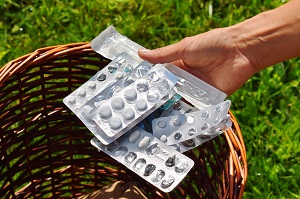 In another dark news day for the sunshine vitamin, a randomized clinical trial has found no benefit to high-dose vitamin D in patients with moderate-to-severe COVID-19, researchers report in JAMA. A retrospective analysis published in Mayo Clinic Proceedings, covered in the Dispatch on January 12, 2021, reached similar conclusions.
In another dark news day for the sunshine vitamin, a randomized clinical trial has found no benefit to high-dose vitamin D in patients with moderate-to-severe COVID-19, researchers report in JAMA. A retrospective analysis published in Mayo Clinic Proceedings, covered in the Dispatch on January 12, 2021, reached similar conclusions.
Also in JAMA, CDC director Rochelle Walensky, MD, MPH, along with the CDC’s Henry Walke, MD, MPH, and National Institute of Allergy and Infectious Diseases (NIAID) director Anthony Fauci, MD, have published a viewpoint addressing SARS-CoV-2 “variants of concern.” In it, they summarize the knowns and unknowns about virus transmission and the “proactive rather than reactive response” that their respective agencies are taking to monitor, diagnose, treat, and vaccinate against the disease.
Shelley Wood contributed today’s Dispatch.
February 18, 2021
COVID-19 cases were down by 41%, and deaths by 22%, in the United States over the last 2 weeks, but complacency could have dire outcomes, warn several members of President Biden’s COVID-19 advisory board during the presidential transition. “This feel-good moment is obscuring what could be a dismal spring and the potential of further lockdowns unless we can continue to slow the spread of this virus,” they write in an editorial in the New York Times. Keys to ultimately defeating the virus, they say, include proper and ubiquitous mask-wearing, adhering to household bubbles, being vaccinated, getting help for small businesses that need to remain shuttered, and protecting workers required in essential roles.
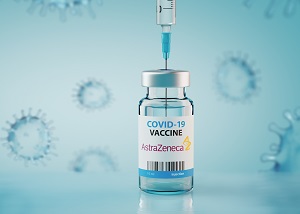 Doctors in Germany are “pleading” with the public to go and get vaccinated as vials of the AstraZeneca vaccine sit unused at “no-show” appointments. Officials in other European countries are also reporting a reluctance to get the British-made vaccine, the Guardian reports. “If you are given the choice between AstraZeneca now or another vaccine in a few months, you should definitely take AstraZeneca now,” Carsten Watzl, general secretary of the German Society for Immunology, is quoted by the paper. The AstraZeneca vaccine was shown to be roughly 60% effective, compared with the more than 90% effectiveness seen with other approved products.
Doctors in Germany are “pleading” with the public to go and get vaccinated as vials of the AstraZeneca vaccine sit unused at “no-show” appointments. Officials in other European countries are also reporting a reluctance to get the British-made vaccine, the Guardian reports. “If you are given the choice between AstraZeneca now or another vaccine in a few months, you should definitely take AstraZeneca now,” Carsten Watzl, general secretary of the German Society for Immunology, is quoted by the paper. The AstraZeneca vaccine was shown to be roughly 60% effective, compared with the more than 90% effectiveness seen with other approved products.
In a British series of patients hospitalized for severe COVID-19 who were diagnosed with troponin elevation, half had cardiac damage detected on MRI at least 1 month after hospital discharge, researchers report today in the European Heart Journal. The role of cardiac imaging in diagnosing cardiac injury after SARS-CoV-2 infection—and just how common this kind of damage may be—has for months been a contentious topic; this latest study, looking at 148 patients in London, England, will no doubt heap fuel on that fire. Stay tuned for TCTMD’s coverage.
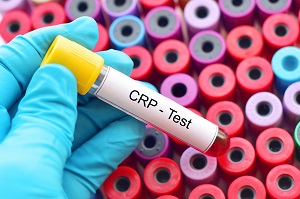 Another study—this one in Circulation—proposes a multiple biomarker strategy for stratifying risk among patients hospitalized for COVID-19. The retrospective analysis of 3,281 consecutive patients hints that those with no elevated biomarkers are at low risk of critical illness and death, whereas continuous C-reactive protein, D-dimer, and troponin concentrations were each associated with mortality, and presence of one, two, or three biomarkers increased the risk of adverse events in a stepwise manner. Use of the model to classify risk has not yet been externally validated, the authors caution.
Another study—this one in Circulation—proposes a multiple biomarker strategy for stratifying risk among patients hospitalized for COVID-19. The retrospective analysis of 3,281 consecutive patients hints that those with no elevated biomarkers are at low risk of critical illness and death, whereas continuous C-reactive protein, D-dimer, and troponin concentrations were each associated with mortality, and presence of one, two, or three biomarkers increased the risk of adverse events in a stepwise manner. Use of the model to classify risk has not yet been externally validated, the authors caution.
Should the willful dissemination of anti-vaccine misinformation be criminalized? Two experts tackle that thorny question head-to-head today in the BMJ. “Melinda Mills says that we must, reluctantly, consider criminalizing people who deliberately spread false information—but Jonas Sivelä argues that the definitions are too murky and that criminalization may do more harm than good.”
The New England Journal of Medicine has swiftly put online several letters received in response to the publication of the Pfizer/BioNtech BNT162b2 vaccine trial on December 10, 2020. Two letters question data or analyses in the paper, but these concerns are countered and dismissed in the reply led by Pfizer physician Judith Absalon, MD, MPH, also published today. In a third letter, two Canadian MDs make the case for delaying the second dose of this vaccine until “all priority group members are offered at least one dose.” Their own analysis, which used vaccine efficacy information beginning at the 2-week mark that had been submitted to the US Food and Drug Administration (FDA), concludes that first-dose efficacy is in the range of 92%, similar to that seen after the first dose of the Moderna vaccine. In their response, the study authors stress that alternate dosing regimens have not been evaluated and that the decision to implement alternative dosing regimens is the purview of health authorities. Reuters sums up the Canadian researcher’s findings.
Another letter to the editor in NEJM raises questions about the Pfizer/BioNTech vaccine’s efficacy against the South African variant. An in vitro analysis intended to simulate a virus with the same mutations as B.1.351 suggested that this variant could reduce the protective antibodies produced by the BNT162b2 vaccine. “The onset of protection after one dose of BNT162b2 precedes the development of high neutralizing titers, and BNT162b2 immunization also elicits CD8+ T-cell responses. Thus, it is unclear what effect a reduction in neutralization by approximately two-thirds would have on BNT162b2-elicited protection from COVID-19 caused by the B.1.351 lineage of SARS-CoV-2,” Yang Liu, PhD, and colleagues write in their letter. A Reuters story explains the knowns and unknowns.
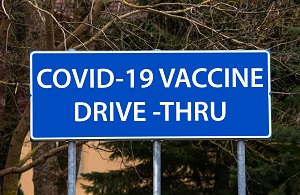 Drive-through vaccination services are perceived as safer, more convenient, and less contagious, according to an analysis of the “world’s largest drive-through, mass vaccination clinic,” in Louisville, KY, where two-thirds of the nearly 20,000 residents vaccinated in just 1.5 days opted for the drive-through option. "This could readily be done in literally every single community, transforming the trajectory of the COVID-19 pandemic once and for all," study author Sunderesh Heragu, MBA, PhD, is quoted in a press release. The paper appeared in the INFORMS Journal on Applied Analytics.
Drive-through vaccination services are perceived as safer, more convenient, and less contagious, according to an analysis of the “world’s largest drive-through, mass vaccination clinic,” in Louisville, KY, where two-thirds of the nearly 20,000 residents vaccinated in just 1.5 days opted for the drive-through option. "This could readily be done in literally every single community, transforming the trajectory of the COVID-19 pandemic once and for all," study author Sunderesh Heragu, MBA, PhD, is quoted in a press release. The paper appeared in the INFORMS Journal on Applied Analytics.
An analysis of 25 New England hospitals forming a hub-and-spoke network for stroke care confirms a pattern seen in other analyses, in particular a decrease in ischemic stroke admissions and less adherence to stroke quality-of-care measures. More surprisingly, authors also documented a decrease in telestroke consultations and no increase in thrombectomy or decrease in the severity of presentations “that might be expected if patients with milder symptoms avoided hospitalization,” they write in Stroke.
The US National Institutes of Health has announced it will study the use of the antiviral remdesivir (Veklury; Gilead Sciences) in pregnant women with COVID-19. There is an “urgent need” to address the safety and efficacy of treatments in pregnant women. For now, the drug is approved for use in adults and children over age 12, but it has not specifically been approved in pregnancy; providers can prescribe the drug if they believe it may be of benefit.
 Nursing schools have seen a 6% spike in enrollment during the pandemic, according to an annual survey by the American Association of Colleges of Nursing. “In the pandemic we saw an increased visibility of nurses, and I think that’s been inspirational to many people,” association president Deb Trautman, is quoted on KHN.org. “It’s a profession where you can make a difference.”
Nursing schools have seen a 6% spike in enrollment during the pandemic, according to an annual survey by the American Association of Colleges of Nursing. “In the pandemic we saw an increased visibility of nurses, and I think that’s been inspirational to many people,” association president Deb Trautman, is quoted on KHN.org. “It’s a profession where you can make a difference.”
Shelley Wood contributed today’s Dispatch.
February 17, 2021
 COVID-19 cases continue to fall in most parts of the world, with the most recent update from the World Health Organization (WHO) showing that there were 2.7 million new cases reported last week, a decline of about 500,000 or 16% from the previous week. The number of new deaths declined by about 10%. Five out of six WHO regions experienced a double-digit percentage decline in new cases, with the biggest drops in Europe and the Americas; however, the Eastern Mediterranean region saw a 7% rise.
COVID-19 cases continue to fall in most parts of the world, with the most recent update from the World Health Organization (WHO) showing that there were 2.7 million new cases reported last week, a decline of about 500,000 or 16% from the previous week. The number of new deaths declined by about 10%. Five out of six WHO regions experienced a double-digit percentage decline in new cases, with the biggest drops in Europe and the Americas; however, the Eastern Mediterranean region saw a 7% rise.
The United Kingdom has become the first country to approve human challenge trials—used in the past to learn about diseases like malaria, influenza, typhoid, and cholera—that will expose volunteers to COVID-19 for research purposes, Reuters reports. The first such trial, expected to start within a month, will include up to 90 healthy volunteers ages 18 to 30, who will be exposed to the smallest amount of the virus needed to cause infection.
A group of experts is calling on the US Centers for Disease Control and Prevention (CDC) to immediately address standards in high-risk workplaces, like hospitals, schools, and meatpacking plants, to deal with airborne transmission of SARS-CoV-2, the New York Times reports. “The 13 experts—including several who advised President Biden during the transition—urged the administration to mandate a combination of masks and environmental measures, like better ventilation, to blunt the risks in various workplaces.”
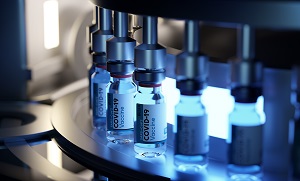 Pfizer’s planned COVID-19 vaccine supply for the European Union is lagging behind by about 30%, after the company failed to deliver about 10 million doses due in December, Reuters reports. “The delay is another blow to the EU, which has also been hit by delays in deliveries from Anglo-Swedish drugmaker AstraZeneca and US company Moderna, and had also faced earlier delays on the Pfizer vaccine.”
Pfizer’s planned COVID-19 vaccine supply for the European Union is lagging behind by about 30%, after the company failed to deliver about 10 million doses due in December, Reuters reports. “The delay is another blow to the EU, which has also been hit by delays in deliveries from Anglo-Swedish drugmaker AstraZeneca and US company Moderna, and had also faced earlier delays on the Pfizer vaccine.”
Meanwhile, the European Commission has pledged more money to beef up the EU’s ability to address emerging SARS-CoV-2 variants. Experts believe the B.1.1.7 variant first detected in the UK will likely become prevalent on the European continent. “However, most European Union states have so far done little or nothing to spot new variants, as they lack the capabilities to sequence the genome of the virus on a large scale.” The additional funds will include at least 75 million euros for the development of specialized tests to detect variants and 150 million euros for research.
In the United States, the more-infectious, and potentially deadlier, B.1.1.7 variant has been identified in 1,173 patients across 39 states and the District of Columbia as of February 14, researchers write in Morbidity and Mortality Weekly Report. Detailed information on eight patients in Minnesota, shows that six had exposure histories related to travel (although none had traveled to the UK), one related to the household, and one related to the community. Identification of the variant in Minnesota “highlights the importance of mitigation measures such as mask use, physical distancing, avoiding crowds and poorly ventilated indoor spaces, isolation of persons with diagnosed COVID-19, quarantine of close contacts of persons with COVID-19, and adherence to CDC travel guidance to slow transmission,” the authors write.
Japan has started its COVID-19 vaccination program, although questions remain about whether enough people will receive shots to ensure that the Summer Olympics, already delayed, can be held in the country, the Associated Press reports. “Japan’s rollout lagged behind other places because it asked vaccine maker Pfizer to conduct clinical trials with Japanese people, in addition to tests already conducted in six other nations—part of an effort to address worries in a country with low vaccine confidence.”
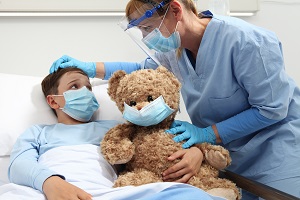 Cases of the multisystem inflammatory syndrome in children (MIS-C) associated with SARS-CoV-2 infection are increasing—though the condition remains rare overall—and becoming more severe, according to a story in the New York Times. One physician said that during the first wave of the pandemic, about half of MIS-C patients at her center required ICU care, with that proportion now as high as 90%. The reasons are not clear, with experts saying it’s too early to speculate about the potential impact of new viral variants.
Cases of the multisystem inflammatory syndrome in children (MIS-C) associated with SARS-CoV-2 infection are increasing—though the condition remains rare overall—and becoming more severe, according to a story in the New York Times. One physician said that during the first wave of the pandemic, about half of MIS-C patients at her center required ICU care, with that proportion now as high as 90%. The reasons are not clear, with experts saying it’s too early to speculate about the potential impact of new viral variants.
Back in July, researchers reported that a major genetic risk factor for severe COVID-19 was inherited from Neanderthals. But now, researchers have uncovered a genomic region traced back to Neanderthals that instead confers protection against severe disease. This group of genes, “present at substantial frequencies in all regions of the world outside Africa,” is associated with a roughly 22% lower relative risk of becoming severely ill, according to findings published in PNAS.
Apple has unveiled a small change to its syringe emoji to remove drops of blood.
— CNN (@CNN) February 17, 2021
It's part of iOS 14.5 beta, which also has a number of new emoji options, including a heart on fire, a face with swirly eyes and the ability for women and men to have beards. https://t.co/7C406hzGBP
Apple has modified its syringe emoji to remove drops of blood, a change that at least one commentator linked with the COVID-19 vaccine rollout, now underway, CNN reports. “Removing the blood makes this emoji more versatile, and also might remove any misconception that vaccination involves blood,” Jeremy Burge, the chief emoji officer of Emojipedia, an online emoji dictionary, said. “Whether this directly impacts how the emoji is used or if it assists vaccination rates we don't yet know, but it shouldn't hurt.”
Also filed under digital adaptations to COVID-19: Apple has released an update for iPhones that are equipped with Face ID to unlock, since facial recognition is complicated by mask-wearing. The new feature will recognize users trying to unlock their phones while wearing a mask, so long as their Apple Watch is close by, the Sydney Morning Herald reports. Users who don’t have the Apple Watch will still have to resort to pass codes or pulling down their masks.
February 16, 2021
 Data released by a British research group last month suggested the SARS-CoV-2 variant called B.1.1.7 may be deadlier than the original form of the virus, and updated analyses released late last week bolster that conclusion. As reported by the New York Times, the variant—first detected in the United Kingdom—transmits 35% to 45% more easily and has spread to at least 82 countries.
Data released by a British research group last month suggested the SARS-CoV-2 variant called B.1.1.7 may be deadlier than the original form of the virus, and updated analyses released late last week bolster that conclusion. As reported by the New York Times, the variant—first detected in the United Kingdom—transmits 35% to 45% more easily and has spread to at least 82 countries.
COVID-19 numbers are markedly declining in India, the country with the second highest number of infections behind the United States, and experts don’t know why, according to an Associated Press story. There are now about 11,000 new cases each day, down from a peak of nearly 100,000. Experts have proposed that parts of the country may have reached herd immunity or that Indians have some preexisting protection from the virus. Mask-wearing—which is mandatory in India—may also be playing a role, the government has suggested.
COVID-19 vaccine trials are getting underway in children. On Friday, the University of Oxford announced that it is launching a study of the vaccine it has developed with AstraZeneca in children and teens ages 6 to 17 years. The phase II trial will enroll 300 participants, with 240 receiving the COVID-19 vaccine and the remainder receiving a control meningitis vaccine that is expected to produce similar adverse reactions, such as soreness at the injection site.
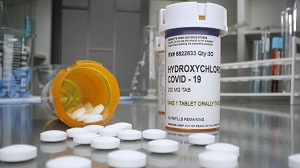 A Cochrane review minces no words over the efficacy of chloroquine or hydroxychloroquine for the prevention or treatment of COVID-19, despite the high hopes for these agents early on in thea pandemic. “Hydroxychloroquine for people infected with COVID‐19 has little or no effect on the risk of death and probably no effect on progression to mechanical ventilation,” the review authors conclude. “Adverse events are tripled compared to placebo, but very few serious adverse events were found. No further trials of hydroxychloroquine or chloroquine for treatment should be carried out.”
A Cochrane review minces no words over the efficacy of chloroquine or hydroxychloroquine for the prevention or treatment of COVID-19, despite the high hopes for these agents early on in thea pandemic. “Hydroxychloroquine for people infected with COVID‐19 has little or no effect on the risk of death and probably no effect on progression to mechanical ventilation,” the review authors conclude. “Adverse events are tripled compared to placebo, but very few serious adverse events were found. No further trials of hydroxychloroquine or chloroquine for treatment should be carried out.”
The American College of Cardiology released a health policy statement last week proposing a scheme for COVID-19 vaccine allocation and prioritization based on level of cardiovascular risk: “Importantly, this schema does not suggest that individuals with lower-risk CV conditions should delay or avoid receiving the vaccine. Rather, its intent is to emphasize that those with relatively higher-risk CV conditions should prioritize their receipt of the vaccine.”
The European Medicines Agency (EMA) has started a rolling review of the COVID-19 vaccine being developed by CureVac AG and has received an application for conditional marketing authorization for the vaccine made by Janssen-Cilag International NV (Johnson & Johnson). A decision on the Janssen vaccine could be made by the middle of March, with some analysis of the data having already been completed during a rolling review. In addition, the EMA’s safety committee has concluded that remdesivir (Veklury; Gilead Sciences) is not associated with an increased risk of acute kidney injury, but has initiated an in-depth evaluation of data to look into reports of sinus bradycardia associated with the antiviral agent.
On Monday, the World Health Organization (WHO) listed two versions of the COVID-19 vaccine made by the University of Oxford and AstraZeneca—one made in South Korea and one in India—for emergency use and global rollout through the COVAX initiative.
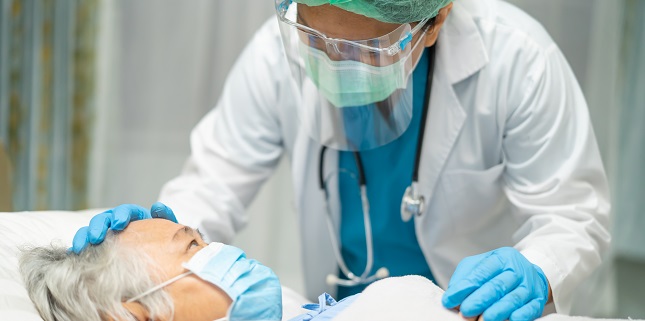 As noted in the Dispatch last week, patients hospitalized with COVID-19 who are treated with prophylactic anticoagulation have a lower risk of death at 30 days when compared with those who don’t receive anticoagulation, according to a cohort study published last week in the BMJ. Speaking with TCTMD’s Michael O’Riordan, the lead investigator said: “We are still awaiting clinical trials to be fully reported. Until then, we think that our findings provide strong, real-world evidence to support guidelines recommending the prophylactic use of anticoagulation as initial therapy upon hospital admission for COVID-19 patients.” In the study, use of prophylactic anticoagulation was also associated with a lower risk of inpatient mortality, as well as less need to start therapeutic anticoagulation, a marker of clinical deterioration.
As noted in the Dispatch last week, patients hospitalized with COVID-19 who are treated with prophylactic anticoagulation have a lower risk of death at 30 days when compared with those who don’t receive anticoagulation, according to a cohort study published last week in the BMJ. Speaking with TCTMD’s Michael O’Riordan, the lead investigator said: “We are still awaiting clinical trials to be fully reported. Until then, we think that our findings provide strong, real-world evidence to support guidelines recommending the prophylactic use of anticoagulation as initial therapy upon hospital admission for COVID-19 patients.” In the study, use of prophylactic anticoagulation was also associated with a lower risk of inpatient mortality, as well as less need to start therapeutic anticoagulation, a marker of clinical deterioration.
Simply having COVID-19 vaccines available will not be enough to bring the pandemic under control, researchers argue in the Lancet. Rather, the vaccines “need to be produced at scale, priced affordably, allocated globally so that they are available where needed, and widely deployed in local communities.” The paper also contains information from a 32-country survey showing that vaccine acceptance is highest in Vietnam (98%) and lowest in Serbia (38%).
A study in Biophysical Journal suggests the humidity that builds up inside masks, and thus increased hydration of the respiratory tract, may help lessen the severity of COVID-19. “High levels of humidity have been shown to mitigate severity of the flu, and it may be applicable to severity of COVID-19 through a similar mechanism,” the lead author said in a press release from the US National Institutes of Health (NIH).
 France’s health authority has said that people who have been infected with COVID-19 should receive only one shot of the vaccine instead of the usual two because they already have some immunity to the disease, BBC News reports. “The single vaccine dose will thus play the role of a booster” for someone previously infected with coronavirus, the Haute Autorité de Santé (HAS) said. France is the first country to issue such a recommendation.
France’s health authority has said that people who have been infected with COVID-19 should receive only one shot of the vaccine instead of the usual two because they already have some immunity to the disease, BBC News reports. “The single vaccine dose will thus play the role of a booster” for someone previously infected with coronavirus, the Haute Autorité de Santé (HAS) said. France is the first country to issue such a recommendation.
COVID-19: TCTMD’s Daily Dispatch for February 2021 Week 4
COVID-19: TCTMD’s Daily Dispatch for February 2021 Week 2
COVID-19: TCTMD’s Daily Dispatch for February 2021 Week 1
COVID-19: TCTMD’s Daily Dispatch for January 2020
Todd Neale is the Associate News Editor for TCTMD and a Senior Medical Journalist. He got his start in journalism at …
Read Full Bio

Comments